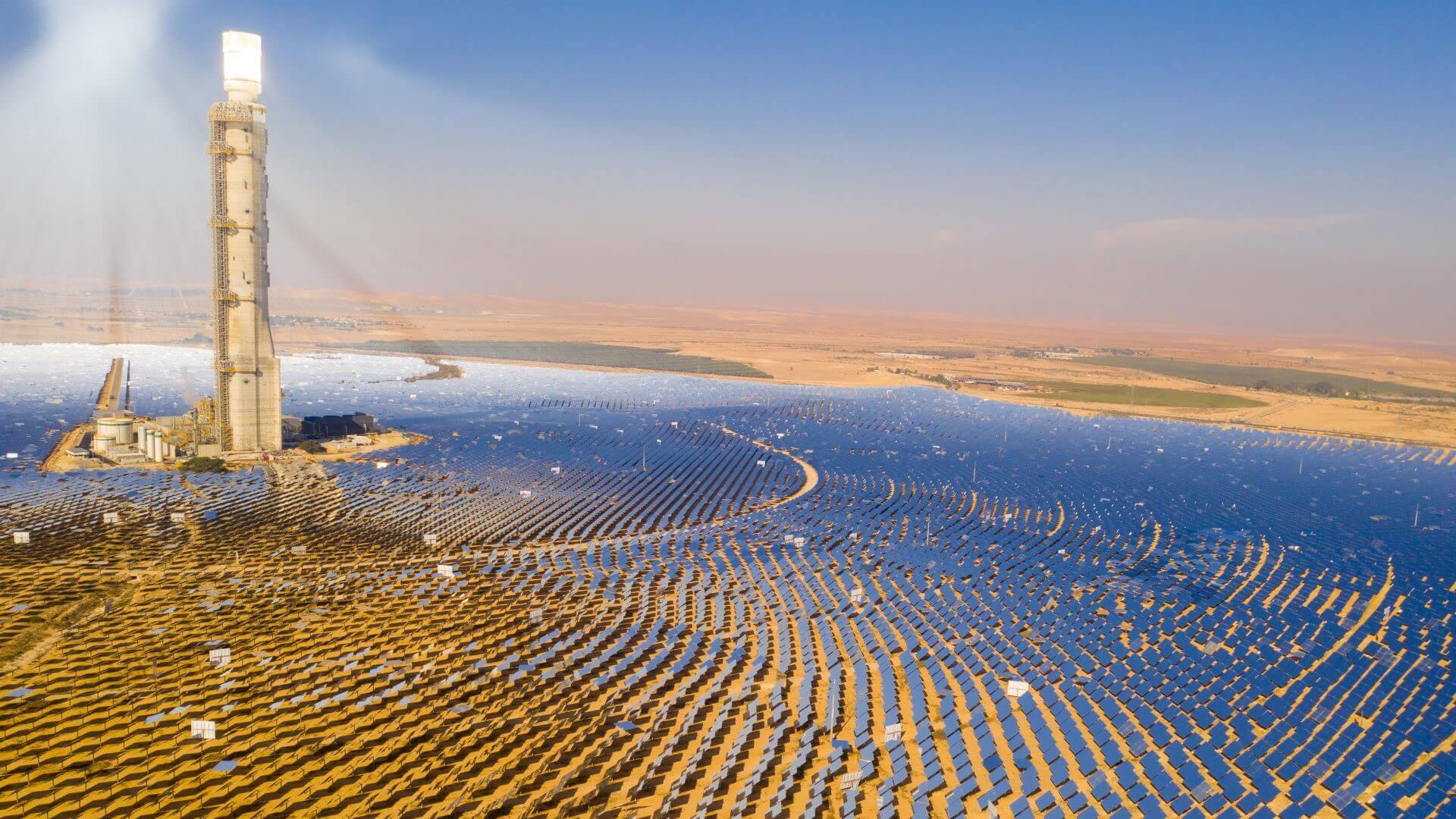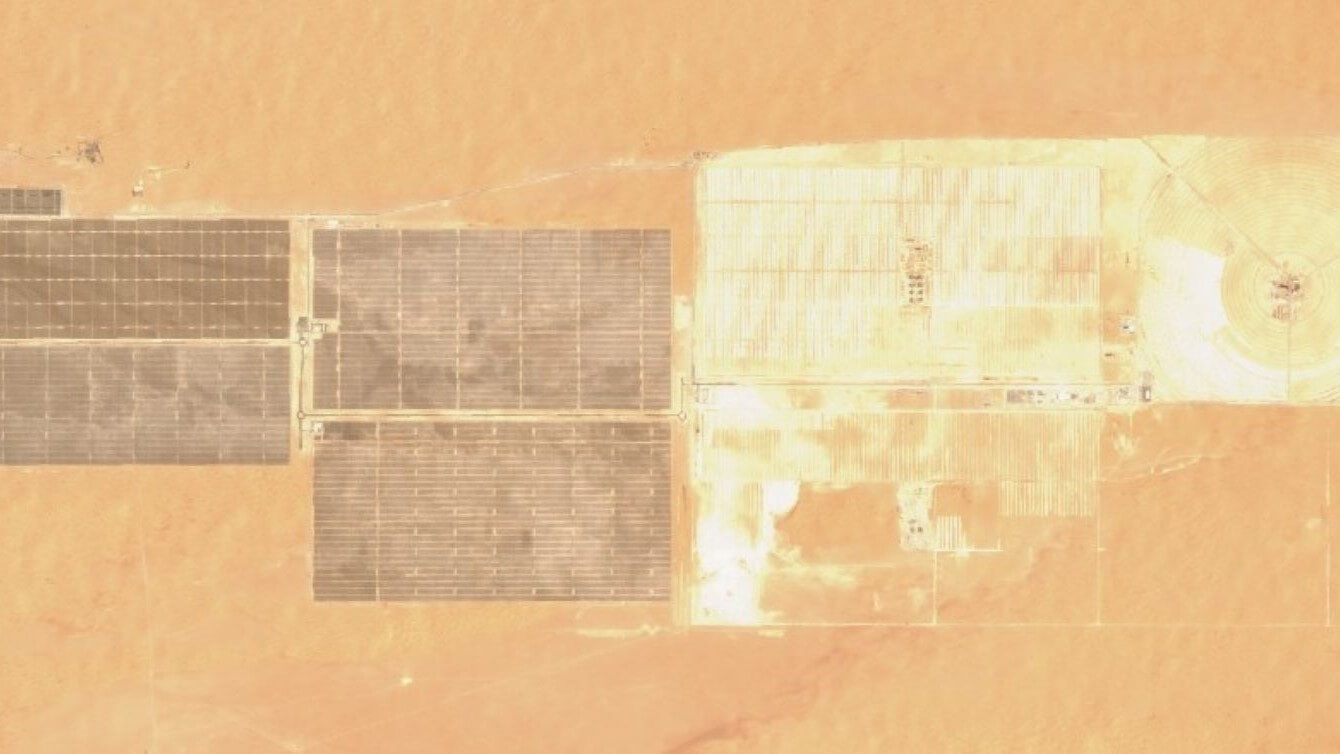UPDATED 1 Sept: The EI library in London is temporarily closed to the public, as a precautionary measure in light of the ongoing COVID-19 situation. The Knowledge Service will still be answering email queries via email , or via live chats during working hours (09:15-17:00 GMT). Our e-library is always open for members here: eLibrary , for full-text access to over 200 e-books and millions of articles. Thank you for your patience.
New Energy World™
New Energy World™ embraces the whole energy industry as it connects and converges to address the decarbonisation challenge. It covers progress being made across the industry, from the dynamics under way to reduce emissions in oil and gas, through improvements to the efficiency of energy conversion and use, to cutting-edge initiatives in renewable and low-carbon technologies.
Harnessing the desert sun for a new Middle East energy future
1/11/2023
8 min read
Feature
The Middle East stands at a pivotal stage given its vast potential to move from reliance on oil wealth to become a powerhouse of solar energy. But there are hurdles to overcome in terms of significant systemic change, development of new regulatory frameworks and skill gaps, explains Sara Siddeeq.
The Middle East has long been at the epicentre of global energy dynamics. For decades, its vast oil reserves have not only fuelled the engines of the global economy but also profoundly shaped the socio-economic and geopolitical contours of the region.
However, the global shift towards sustainability, climate change concerns and the erratic nature of oil markets have nudged the region to rethink its energy paradigm. Vast arid expanses and abundant sunshine make the Middle East an ideal locale for harnessing solar energy, offering a sustainable and inexhaustible alternative to fossil fuels.
Saudi Arabia and the United Arab Emirates (UAE) collectively generate 90% of the Gulf's renewable energy output. They are at the forefront of the region’s renewable energy revolution, establishing ambitious targets to curtail their reliance on oil and diversify their energy portfolios. A pragmatic economic rationale is helping to drive this transformation as the plummeting costs of solar technologies and the prospect of establishing a robust renewable energy sector promise both energy security and new avenues of economic growth and job creation.
Unleashing sun-powered innovations
The journey from fossil fuels to renewable energy, particularly solar power, in the Middle East is propelled by relentless technological advancements. One of the fundamental breakthroughs has been in the field of photovoltaic (PV) technology. Soaring efficiency rates, for example due to advancements in thin-film solar cells and perovskite materials, along with the plummeting costs of solar panels, have made solar energy a cost-competitive contender in the region’s energy arena.
Moreover, the advent of concentrated solar power (CSP) technology is proving to be a game changer. Unlike traditional solar panels, CSP systems harness solar energy by using mirrors or lenses to concentrate a large area of sunlight onto a small area. The heat generated is then used to produce steam, which drives a turbine connected to an electricity generator. The Middle East’s copious sunshine provides an ideal setting for CSP installations, and projects like the Mohammed bin Rashid Al Maktoum Solar Park in Dubai exemplify the region’s growing prowess in this domain.
Additionally, the development of robust energy storage solutions addresses the intermittent nature of solar energy, making it a reliable power source even when the sun is down. Furthermore, the integration of smart grids and digital monitoring systems is enhancing the operational efficiency and maintenance of solar installations. The Middle East is also witnessing a surge in research and development activities aimed at advancing solar technology.

The 580 MW Noor Ouarzazate Solar Complex in Morocco is the world’s largest concentrated solar power facility
Photo: Adobe Stock
Navigating the hurdles
While the trajectory towards solar energy adoption in the Middle East appears promising, the journey is laden with challenges. The leap from a hydrocarbon-centric economy to a renewable energy-driven paradigm is nuanced and complex.
One of the paramount challenges is the existing energy infrastructure that is predominantly designed for fossil fuel utilisation. Retrofitting or replacing this infrastructure to accommodate solar energy on a large scale requires significant investments in grid upgrades and storage systems, while also establishing a supportive regulatory framework that incentivises renewable energy adoption.
Moreover, the intermittency of solar power, despite advancements in energy storage solutions, remains a concern. Ensuring a reliable power supply that can meet the demands of growing populations and industrial operations is crucial for gaining public and private sector confidence in solar energy.
One of the paramount challenges is the existing energy infrastructure that is predominantly designed for fossil fuel utilisation. Retrofitting or replacing this infrastructure to accommodate solar energy on a large scale requires significant investments.
Additionally, the region faces a skills gap in the renewable energy sector. While strides are being made towards cultivating a knowledgeable workforce through educational programmes and international collaborations, the pace needs to be accelerated to meet the growing demands of the solar industry.
In Jordan, nationwide campaigns have been instrumental in educating the public on the benefits of solar energy, marking a step towards altering the deeply ingrained oil culture.
Furthermore, political instability, regulatory inconsistencies across different countries and the lack of a unified energy policy framework can stymie the growth of the region’s solar sector. Encouraging cross-border collaborations and creating a harmonised regulatory environment are imperative for overcoming these hurdles.
Lastly, the deeply ingrained oil culture necessitates a concerted effort in public education and engagement to foster a broader understanding and acceptance of renewable energy benefits.
Navigating these challenges requires a holistic approach that encompasses governmental support, private sector engagement, public education and international collaborations. Addressing the existing hurdles with pragmatic and forward-thinking strategies is crucial for turning the solar promise into a reality.
Economic horizons
Despite the labyrinth of obstacles, the Middle East stands on the cusp of an economic renaissance fuelled by its growing renewable energy sector.
A salient feature of the solar development is job creation. The installation, maintenance and management of solar facilities necessitate a skilled workforce, thereby creating a plethora of employment opportunities. Moreover, the nascent industry is poised to spark a wave of entrepreneurial ventures, fostering innovation and business growth which can have a far-reaching impact on the region’s economic fabric.
The plummeting cost of solar technologies, coupled with the region’s favourable solar resources, presents an attractive investment landscape for both local and international investors. The solar sector in Saudi Arabia has attracted international firms like Total and EDF, indicating a growing confidence in the region’s solar potential. The influx of investments also extends to ancillary industries such as energy storage, grid modernisation and renewable energy technology innovation.
Moreover, the diversification into solar energy is a strategic move towards reducing the reliance on oil exports, which have historically been susceptible to volatile global market dynamics. This diversification also aligns with the broader economic vision of many Middle Eastern countries to develop a multi-faceted economic base. Furthermore, the export of solar technology and expertise to other regions could become a new frontier of economic engagement.
The transition to solar energy can also trigger advancements in other sectors like water desalination and electric transportation, which are pivotal for the region’s overall economic development.
Pioneering solar endeavours
Emblematic projects in the Middle East and North Africa (MENA) region stand as beacons of both the potential and the challenges inherent in this energy transition. Two notable ventures, the Mohammed bin Rashid Al Maktoum Solar Park in the UAE and the Noor Ouarzazate Solar Complex in Morocco, encapsulate the journey of solar advancement in the region.
The Mohammed bin Rashid Al Maktoum Solar Park, an epitome of the UAE’s ambitious renewable energy goals, is envisioned to be one of the largest solar parks in the world upon completion. However, the project also mirrors the infrastructural and regulatory challenges that come with integrating vast amounts of solar energy into the existing grid. The endeavour to align regulatory frameworks, upgrade grid infrastructure and ensure a steady financial inflow for the project reflects a microcosm of the broader challenges facing the region’s solar transition.
To the west of the MENA region, the Noor Ouarzazate Solar Complex in Morocco stands as a testament to the potential of CSP. The project not only underscores the technical prowess involved but also the international collaboration necessary for such grand-scale renewable ventures. Yet, the complex also faced hurdles, from initial financial mobilisation to navigating the technical and logistical challenges posed by the harsh desert environment.
Both these pioneering projects underline the essence of international collaboration, technological innovation, and regulatory foresight in overcoming the hurdles on the path to solar energy adoption. Moreover, the success of these projects is igniting interest and confidence among other nations in the region to embark on their solar ventures.

The Mohammed bin Rashid Al Maktoum Solar Park is able to generate 2,327 MW
Photo: Wiki
Global resonance
Solar projects such as these underscore the pivotal role of policies in either fuelling or fettering the solar transition in the Middle East.
On one hand, progressive policies such as feed-in tariffs, tax incentives and renewable energy targets are acting as catalysts for solar adoption. Countries like the UAE and Jordan have been proactive in crafting conducive policy landscapes that stimulate investments, drive technological adoption and foster a culture of innovation in the solar sector.
Conversely, inconsistent regulatory frameworks, bureaucratic red tape and the lack of a harmonised energy policy across the region pose as deterrents. The intricacies of land acquisition, grid access and subsidy regimes often encumber the pace of solar projects. Addressing these policy impediments is crucial for creating a seamless pathway for solar energy integration.
The ripple effect of the Middle East’s solar transition resonates well beyond its sandy shores. The diminishment of oil as the anchor of economic and geopolitical engagements could potentially recalibrate global energy dynamics. It opens avenues for new alliances centred around renewable energy technology collaboration, knowledge exchange and mutual investments in clean energy projects.
Moreover, the global implications extend to climate change mitigation. A substantial commitment to solar energy from the Middle East can contribute significantly to global carbon emission reduction goals.
Looking ahead
As the Middle East oscillates between the intricacies of policy frameworks and the global resonance of its renewable energy ambitions, future prospects will unfold with a blend of promise and prudence. The region stands at a pivotal juncture, with the potential to morph into a global cynosure in terms of solar energy technology and export.
The abundant solar resources, growing investments in research and development, and the momentum garnered from flagship solar projects lay a robust foundation for the Middle East to ascend as a global solar powerhouse. However, the horizon is not without its clouds. There remain persistent policy bottlenecks, the need for a skilled workforce adept in renewable energy technologies, and the overarching requirement for a conducive regulatory and investment climate.
To sustain and accelerate renewable energy adoption, a multi-pronged strategy is imperative. Firstly, a harmonised and supportive policy framework across the region is essential for solar investments. Secondly, nurturing a skilled workforce is crucial for building the technical acumen necessary for the industry’s growth. The unfolding solar narrative in the Middle East is not just a regional endeavour but a global tableau. The steps taken today in nurturing the solar ecosystem, refining policies and forging global alliances will significantly imprint on the global renewable energy tapestry.
